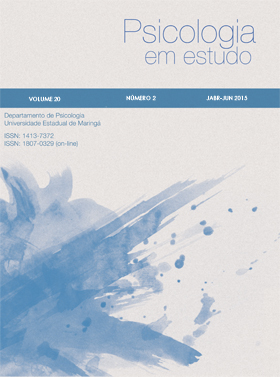DÂNDI E FLÂNEUR: MODOS DE SUBJETIVAÇÃO DA MODERNIDADE E OS MODS INGLESES
Resumo
A organização social em torno das grandes cidades é apontada como causadora principal da criação do sujeito da modernidade, o qual é, sobretudo, individualista e privatizado. A vida em meio ao nascente caos urbano e de aglomeração das multidões de pessoas possibilita delinearmos alguns modos de subjetivação consequentes e que emergem em tal configuração e contexto sócio-histórico e cultural. O poeta Charles Baudelaire é tido como personagem importante para a compreensão da modernidade, visto que traduziu a sensação do habitante citadino e assumiu papéis distintos frente a essa vida urbana. A partir de considerações breves sobre a cidade moderna, buscamos elencar modos de subjetivação da modernidade (materializados e expressos, sobretudo, nas figuras do dândi e do flâneur), apresentando algumas das características principais, para em sequência relacionar as formas de atualização, assunção e distorção destes pelos integrantes de uma popular subcultura juvenil inglesa surgida na segunda metade do século XX: os mods.Downloads
Referências
Anderson, P (2014). Mods, the new religion: the style and music of the 1960s mods. London: Omnibus Press.
Baudelaire, C. (2009). O Dândi – Charles Baudelaire. In Balzac, H., Baudelaire, C & D’Aurevilly, B. Manual do dândi: a vida com estilo. (pp 11-20). Belo Horizonte: Autêntica.
BBC. British Style Genius – Loud and Proud: the street look. (2008). Dir: Stevie Condie.
Benjamin, W. (1989). Charles Baudelaire: um lírico no auge do capitalismo. São Paulo: Brasiliense.
Benjamin, W. (1991). Textos de Walter Benjamin. São Paulo: Ática.
Bolle, W. (2015). A Paris de David Harvey e a de Walter Benjamin. Folha de S.Paulo. Ilustríssima, 09/08/2015. Não paginado. Acesso em 16 de agosto de 2015, em .
Boyle, L. (2011). Beau Brummell and the Birth of Regency fashion: Was Beau Brummell a Dandy?. Jane Austen Centre, 17 de jun. 2011. Acesso em 17 de agosto de 2015 em .
Bushell, G. (2012). Time for Action: the mod revival 1978-1981. London: Countdown Books.
Casburn, M. (2004) A Concise History of the British Mod Movement. San Francisco: The Greater Bay Area Costumers Guild. Acesso em 06 de junho de 2015 em
Castro, F. C. G. (2010). Dandismo e cuidado de si: ensaios de subjetivação em Balzac. Tese de Doutorado, Programa de Pós Graduação em Psicologia Clínica e Cultura, Universidade de Brasília, Brasília, DF.
Cohen, S. (2011). Folk devils and moral panics: the creation of mods and rockers. London: Routledge Classics.
D'Angelo, M. (2006). A modernidade pelo olhar de Walter Benjamin. Estudos avançados, 20(56), 237-251.
Dhoest, A., Malliet, S., Segaert, B. & Haers, J. (orgs.). (2015). The borders of subculture: resistance and the mainstream. New York: Routledge.
Dunker, C. I. L. (2015). Mal estar, sofrimento e sintoma: uma psicopatologia do Brasil. São Paulo: Boitempo Editorial.
Gruda, M. P. P. & Gamba, J. S. (2014). Identidade, relações grupais e conflitos geracionais no filme Quadrophenia: “can you see the real me?”. Sessões do Imaginário, 19(31), 85-95.
Hall, S. (2015). A Identidade cultural na pós-modernidade. (12a ed). Rio de Janeiro: Lamparina.
Harvey, D. (2014). Condição Pós-Moderna: uma pesquisa sobre as origens da mudança cultural. (25a ed). São Paulo: Edições Loyola
Harvey, D. (2015). Paris, capital da modernidade. São Paulo: Boitempo.
Hebdige, D. (2002). Subculture: the meaning of style. London: Routledge.
Hewitt, P. (org.). (2010). The sharper word: a Mod anthology. London: Helter Skelter.
Jesse, W. (1844). The life of George Brummell commonly called Beau Brummell. Vol I. London: Saunders & Otley.
Laing, D. (1969). The sound of our time. London: Sheed & Ward.
Montero, P. (2008) Passagens na metrópole paulistana do século XXI. Novos estud. - CEBRAP, 82, 191-199.
Ortiz, R. (2000). Walter Benjamin e Paris – individualidade e trabalho intelectual. Tempo Social, Rev. Sociol. USP, 12(1), 11-28.
Perone, J. (2009). Mods, rockers, and the music of the British invasion. Westport: Greenwood Publishing.
Rodgers, N. (2012). The Dandy: Peacock or Enigma? London: Bene Factum Publishing.
Sennett, R. (2003). Carne e pedra: o corpo e a cidade na civilização ocidental. (3a ed). Rio de Janeiro: Record.
Simonelli, D. (2013). Working class heroes: rock music and British society in the 1960s and 1970s. Plymouth: Lexington Books.
United Nations, Department of Economic and Social Affairs, Population Division (2014). World Urbanization Prospects: The 2014 Revision, CD-ROM Edition. Acesso em 14 de agosto de 2015 em .
Weight, R. (2013). MOD: From Bebop to Britpop, Britain’s Biggest Youth Movement. London: Bodley Head.
As opiniões emitidas, são de exclusiva responsabilidade do(s) autor(es). Ao submeterem o manuscrito ao Conselho Editorial de Psicologia em Estudo, o(s) autor(es) assume(m) a responsabilidade de não ter previamente publicado ou submetido o mesmo manuscrito por outro periódico. Em caso de autoria múltipla, o manuscrito deve vir acompanhado de autorização assinada por todos os autores. Artigos aceitos para publicação passam a ser propriedade da revista, podendo ser remixados e reaproveitados conforme prevê a licença Creative Commons CC-BY.
The opinions expressed are the sole responsibility of the author (s). When submitting the manuscript to the Editorial Board of Study Psychology, the author (s) assumes responsibility for not having previously published or submitted the same manuscript by another journal. In case of multiple authorship, the manuscript must be accompanied by an authorization signed by all authors. Articles accepted for publication become the property of the journal, and can be remixed and reused as provided for in theby a license Creative Commons CC-BY.
















